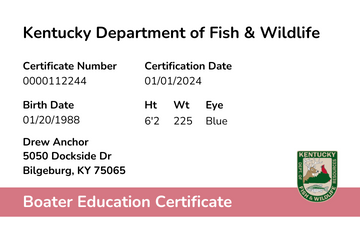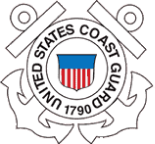Kentucky Boating Laws & Regulations
Age and Operator Requirements
- Minimum Age: Individuals must be at least 12 years old to operate a motorboat or personal watercraft (PWC) with more than 10 horsepower on Kentucky waters.
- Boater Education: Operators aged 12 to 17 are required to complete a boater education course approved by the Kentucky Department of Fish and Wildlife Resources and carry a Boater Education Certificate while operating. You can find a certified course at Recademics Kentucky Boater Education.
- Supervision: Operators under 18 who have not completed the course must be directly supervised by someone at least 18 years old who holds a Boater Education Certificate.
Life Jacket (PFD) Requirements
- General Rule: A U.S. Coast Guard-approved wearable life jacket (Type I, II, or III) must be available for each person on board.
- Children: All children under 12 must wear a life jacket while on the open deck of a moving vessel.
- Throwable Device: Boats 16 feet or longer (excluding canoes and kayaks) must carry a Type IV throwable flotation device.
Boating Under the Influence (BUI)
- Legal Limit: Operating a vessel with a Blood Alcohol Concentration (BAC) of 0.08% or higher is illegal.
- Penalties:
- First Offense: Fine of $200–$250.
- Second Offense: Fine of $350–$500.
- Third or Subsequent Offense: Fine of $600–$1,000 and/or imprisonment for at least 30 days.
- Public Intoxication: Consuming alcohol in public places, including waterways, is prohibited.
Boat Registration and Titling
- Registration: All mechanically powered vessels primarily used in Kentucky must be registered with the county clerk’s office. Registrations expire annually on April 30.
- Out-of-State Vessels: Boats registered in another state may operate in Kentucky for up to 60 consecutive days without registering locally.
- Titling: Kentucky requires titling for all registered boats, except those documented by the U.S. Coast Guard.
Required Safety Equipment
- Personal Flotation Devices (PFDs): One wearable PFD per person on board.
- Fire Extinguisher: Required for boats with enclosed fuel or engine compartments.
- Navigation Lights: Must be operational between sunset and sunrise.
- Sound-Producing Device: A whistle, horn, or bell is required.
- Ventilation and Backfire Flame Arrestor: Required for boats with gasoline engines.
Personal Watercraft (PWC) Regulations
- Life Jackets: Operators and passengers must wear a U.S. Coast Guard-approved Type I, II, or III PFD at all times.
- Safety Lanyard: PWCs must be equipped with an emergency ignition safety switch (kill switch) attached to the operator.
- Operation Hours: PWCs may not be operated between sunset and sunrise.
- Wake Jumping: Prohibited if it endangers life, safety, or property.
Towing and Watersports
- Observer Requirement: When towing a person, an observer at least 12 years old must be on board, or the vessel must be equipped with a wide-angle rearview mirror.
- PFDs: Individuals being towed must wear a properly fitted, U.S. Coast Guard-approved Type I, II, or III PFD.
- Capacity: The towing vessel must have a capacity rating equal to or greater than the number of persons on board and being towed.
Boating Accidents and Reporting
- Immediate Action: Operators involved in an accident must stop, assist injured persons, and provide their name, address, and vessel information.
- Reporting Requirements:
- Within 48 Hours: If the accident results in death, disappearance, or injury requiring medical treatment.
- Within 5 Days: If the accident causes property damage of $500 or more.
Enforcement and Compliance
- Authority: Kentucky Department of Fish and Wildlife Resources officers, along with other peace officers, are authorized to enforce boating laws.
- Compliance: Operators must stop their vessel when signaled by law enforcement and comply with all directives.




